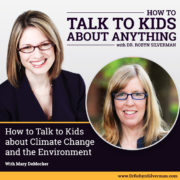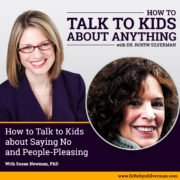How to Talk to Kids about Climate Change and the Environment with Mary DeMocker
Special Guest Expert: Mary DeMocker I remember, as a child, learning that you turn off the faucet while brushing your teeth. You close the refrigerator quickly and turn off the lights when you leave the room—little things- and they needed to be taught because otherwise, I admit, I hadn’t thought much about leaving the tap on, standing in front of the open fridge for minutes figuring out what I wanted to eat or leaving on the lights in every conceivable room. I’ve needed to teach it to my kids too- but of course, they sometimes forget. Sometimes protecting the Earth isn’t the first thought that comes to mind when you’re standing in the shower, letting the hot water fall on your head and back. For some, climate change might feel distant- like something happening elsewhere but not right here at home. Although this seems to be changing a bit- many families, all over the world have found that climate change has begun to touch their lives. Deadlier wild fires, increasingly crazy weather, additional information of melting ice caps on the nightly news- information coming to us through news anchors as well as out of the mouths of younger and younger activists that are demanding awareness and action. My own children have quoted information from Weird But True books and nature documentaries about what’s going on with the polar bears and tropical forests. The truth is, we are all feeling the effects and we are all contributing to the effects of climate change– AND we are also able to help solve the problem. Of course, this means we must have the discussions that can bring about the change. It starts with opening our mouths and our hearts so that we can lay it all on the table. How do we give our children the facts about climate change- from discussions of fossil fuels to fluctuating animal habitats to sustainable and destructive energy sources so that they are in the know? And how can we, as families, alter how we live our lives, in small consistent ways, that will help create a healthier future for our loved ones? We need a climate revolution—and it starts at home, with us.
Our special guest today is Mary Democker. Mary DeMocker’s book, The Parents’ Guide to Climate Revolution: 100 Ways to Build a Fossil-Free Future, Raise Empowered Kids, and Still Get a Good Night’s Sleep is a finalist for the 2019 Oregon Book Award and has been featured on Yale Climate Connections and recommended on NPR and in The New York Times. Mary writes and speaks widely about parenting in a changing climate, helping parents, educators, clinicians, and young people find a positive role in the global transition to a clean energy future. She lives in Eugene, Oregon with her husband and sometimes her son, a freshman in college. His sister older graduated from college last year and is a teacher.


